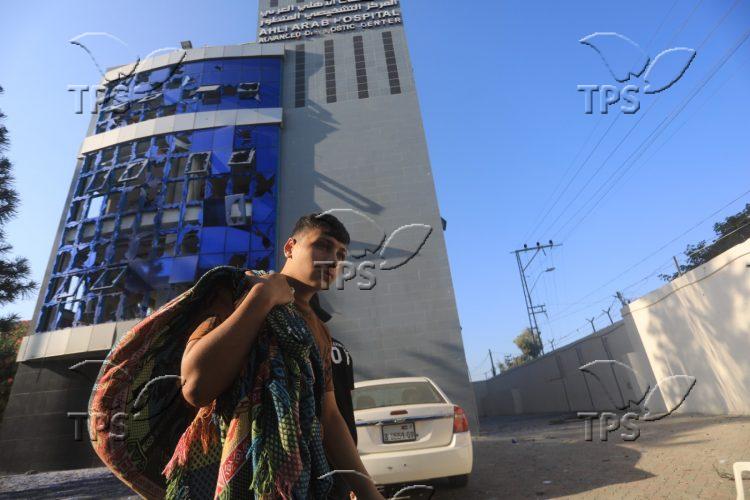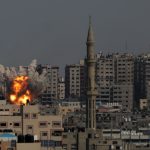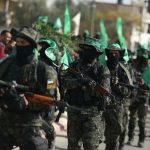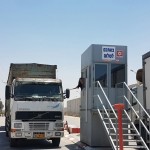‘The Payback Was Overwhelming’: News Services Apologize for Gaza Coverage
Jerusalem, 23 October, 2023 (TPS) -- The New York Times on Monday admitted that its reporting on the Oct. 17 blast at the Al Ahli Hospital in northern Gaza “relied too heavily on claims by Hamas, and did not make clear that those claims could not immediately be verified.” The apology comes on the heels of a similar apology from BBC News.
Both apologies drew scorn from Israelis on social media as too little late, and from media expert Professor Eytan Gilboa.
“They can’t even define and Hamas and Islamic Jihad as terror organizations,” Gilboa, who teaches international communications at Bar-Ilan University in Tel Aviv, told the Tazpit Press Service.
“If you can’t describe them as terror organizations, why should anyone be surprised that that they took Hamas’s inflated claims about the death toll at face value?” Gilboa said.
He faulted both news services failing to verify their information.
“It wasn’t an explosion in the hospital, it was an explosion in a yard. It was not the Israeli Air Force, it was Islamic Jihad. And only 40 or 50 people were killed not 500. They failed to verify every item of the story. Don’t trust the New York Times, don’t trust the BBC. They don’t do a good job,” Gilboa said.
“They only apologized because the payback was overwhelming.”
Hamas health authorities claimed on Oct. 17 that an explosion at Al-Ahli Arab Hospital killed 471 Palestinians. The terrorist group immediately blamed Israel, accusing the Israel Defense Forces of deliberately striking the hospital.
In response to Hamas’s accusations, violence erupted around the Middle East, as angry protesters gathered in front of Israeli diplomatic missions.
Israel released intercepted Hamas communications confirming the blast was caused by a misfired Palestinian Islamic Jihad rocket which exploded in the parking lot of the Al Alhi Hospital in northern Gaza on Tuesday night. It occurred as terror groups fired heavy barrages of rockets at southern and central Israel. Alarms sounded in cities including Rishon Lezion, Petach Tikvah, Bnei Brak, Ramat Gan and Bat Yam.
The Backlash
U.S., French and Canadian intelligence services have confirmed that Israel was not responsible for the explosion, and European intelligence officials cited by the Agence France-Presse, questioned the death toll claimed by the Hamas-run Gaza Health Ministry.
“There weren’t 200 or even 500 deaths. More likely between 10 and 50,” an anonymous source told AFP.
On Thursday, U.S. State Department spokesman Matthew Miller slammed journalists for accepting claims by Hamas officials. “I saw a number of reports … that took Hamas’s word at face value—the word of a terrorist organization,” Miller said.
“I don’t mind people treating our claims skeptically. Everyone has a right to do that. We stand up here every day and defend them, but I would hope that everyone who is watching what’s happening would not take claims from a terrorist organization at face value,” Miller stressed.
Because the BBC is publicly funded, Israeli leaders raised the issue with British Prime Minister Rishi Sunak during his visit on Thursday.
“I know that in modern democracies, like ours and yours, you can’t interfere per se, but since the BBC has a certain linkage and is known as British all over the world, there has to be an outcry for it to be corrected, and that Hamas will be defined as a terrorist organization there as well,” President Isaac Herzog told Sunak.
“What else do they need to see to understand that this is an atrocious terror organization?” Herzog asked.
The Apologies
On Monday, the Times conceded in a special editor’s note that “given the sensitive nature of the news during a widening conflict, and the prominent promotion it received, Times editors should have taken more care with the initial presentation, and been more explicit about what information could be verified.
“Newsroom leaders continue to examine procedures around the biggest breaking news events—including for the use of the largest headlines in the digital report—to determine what additional safeguards may be warranted,” added the editors’ note.
Also on Monday, the BBC announced it would stop describing Hamas as a “militant” group and instead refer to the rulers of the Gaza Strip as “a terrorist organization proscribed by the U.K. government.”
But Professor Gilboa told TPS that the BBC’s new language is still a disservice to the public.
As a publicly funded institution, the BBC “has more responsibility to the public than the New York Times,” Gilboa stressed. But instead of referring to Hamas as “militants,” he said, “Now they say ‘Hamas, a designated terror organization by the British government.’ It shows that you don’t have any standards to define what is reality, what is happening. This is a huge failure of the media.”
The BBC was also forced to apologize for its coverage of Al Ahli Hospital blast. Correspondent Jon Donnison reported from the scene that the hospital had been hit by a missile or shell, adding, “But it’s hard to see what else this could be really given the size of the explosion other than an Israeli air strike or several air strikes.”
In a statement published on the BBC’s Corrections and Clarifications page, the news service wrote, “We accept that even in this fast-moving situation it was wrong to speculate in this way, although he [Donnison] did not at any point report that it was an Israeli strike.”
Citing BBC News’s “biased coverage” of the Gaza war, staff at the Galilee Medical Center in Nahariya banned a film crew from entering the hospital on Saturday.







